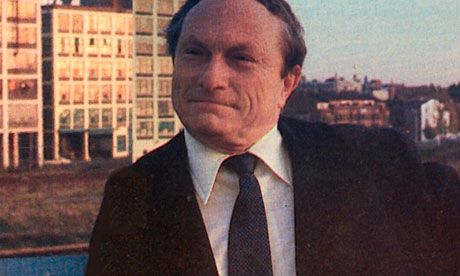Moshe Lewin obituary
Lively, provocative scholar of Soviet social history
 Moshe Lewin fled from the advancing German army in June 1941 in Vilnius by clambering on to the back of a Soviet army lorry
Moshe Lewin fled from the advancing German army in June 1941 in Vilnius by clambering on to the back of a Soviet army lorry Moshe Lewin, who has died aged 88, was one of the foremost scholars of Soviet history. Misha Levin, as he was more familiarly known, was a vibrant and creative intellectual whose work, expressed in a language and style distinctively his own, and informed by his life experiences, made a major contribution to the field of social history.
His magisterial work Russian Peasants and Soviet Power (1968) explores the clash between the world of the peasants and the priorities of an industrialising state in the late 1920s that had little sympathy or comprehension of the peasants' outlook. Lewin retained a strong admiration for the founder of the Bolshevik state, and his book Lenin's Last Struggle (1968) outlined Lenin's ultimately forlorn attempt to create a self-regulating dictatorship that could undertake a project of socialist modernisation, while retaining some measure of popular consent.
An ardent anti-Stalinist, Lewin was interested in the forces that nurtured state despotism. He believed that within Bolshevism, there lay the basis of a more humane, democratic form of socialism. His sympathies lay with Nikolai Bukharin and the rightists in the Communist party, whom he saw as having a greater understanding of the peasant masses than the Trotskyist left. He saw Bukharin's ideas as relevant to the renewal of the Soviet system in the post-Stalin era. His book Political Undercurrents in Soviet Economic Debates: From Bukharin to the Modern Reformers (1974) proved prescient. However, the political rehabilitation of Bukharin under Gorbachev in 1989 proved a brief spring and the dream of a socialist renaissance was soon swept aside.
The rich collection of essays in The Making of the Soviet System (1985) encapsulates much of his thinking. The terms he coined to capture the encounter between the old and new – "quicksand society", "ruralisation of the towns", "peasantisation of the working class" – entered the language of scholarly debate. He believed in the role of the historian as a commentator on the past and the present. His book The Gorbachev Phenomenon: A Historical Interpretation (1988) analysed the reformist movement of the 1980s in terms of the emergence of a new, more educated society challenging the old order of bureaucratic authoritarianism. In Russia/USSR/Russia: The Drive and Drift of a Superstate (1995) and The Soviet Century (2005), he depicted the Stalinist system as a form of "bureaucratic absolutism" that came to outlive its function.
Lewin was born in Vilnius, a region disputed between Poland and Lithuania, to Russian-Jewish parents who died in the Holocaust. In June 1941 he escaped the advancing German army by clambering on to the back of a Soviet army lorry. He worked on collective farms, and then was employed as a furnace operator. In the summer of 1943 he enlisted in the Soviet army and spent the rest of the war in a school for officers.
In 1946 he returned to Poland, but soon after emigrated to France. Five years later he settled in Israel, and worked first on a kibbutz and then as a journalist. He studied at Tel Aviv University, from where he received his BA in 1961. He completed his doctorate on the Soviet collectivisation of agriculture at the Sorbonne in Paris. Intellectually he was profoundly influenced by the Annales school of history, with its focus on the autonomy of social processes and their development in the longue durée (long term).
He served briefly as a senior research fellow at Columbia University in New York City, and from 1968 to 1978 held a research post at the Centre for Russian and East European Studies at Birmingham University. He then returned to the US and took up a professorship at the University of Pennsylvania, where he remained until he retired in 1995.
He seized the opportunities of the opening of the Soviet archives under Gorbachev. Always lively and provocative, he was an intellectual who spoke to a wider public. He had a considerable reputation in France, was a regular correspondent for Le Monde Diplomatique, and spent his final years in Paris.
Those who knew him remember a battered cherub with a ready smile and a puckish sense of humour who exuded a youthful vitality and zest for life, and was a gregarious raconteur.
• Moshe Lewin, historian, born 7 November 1921; died 14 August 2010
______________________________________

No comments:
Post a Comment
Comments